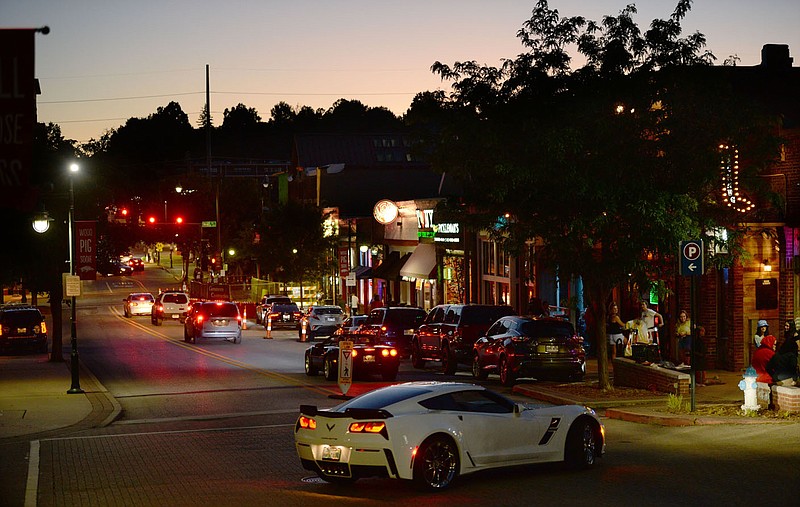FAYETTEVILLE -- Downtown bars and restaurants will be able to serve drinks on the go for at least another three years.
The Outdoor Refreshment Area, which allows people to buy alcoholic drinks inside a business and take them outside, will continue until April 30, 2024. It was set to expire Jan. 30. The City Council decided late in a meeting Tuesday to extend the district.
A state law enacted in 2019 allows cities to create entertainment districts, which allow outdoor drinking within a certain boundary. Cities are allowed to craft their districts in a way that best suits them.
Devin Howland, city economic vitality director, said more than 200,000 cups have gone out the doors of 60 businesses since the program started in July.
Police Chief Mike Reynolds said the Outdoor Refreshment Area proved to be a non-issue for the department. Officers haven't encountered problems, disturbances or complaints associated with the district, he said.
Having a 10 p.m. cutoff time for the district has likely prevented any issues with younger people flouting the rules, Reynolds said.
"Certainly, as a chief, anytime you relax certain things within your community, especially when it revolves around drinking, you always have some concerns," he said. "I've been pleasantly, not only surprised, but pleased, with the outcomes of the program."
The program has helped businesses struggling during the covid-19 pandemic, Howland said. Customers can take drinks and sit outside anywhere in the district, providing a means of safe social interaction, he said.
"While its original intent was about downtown place-making, it became clear very quickly this tool could be used to allow bars and restaurants to safely increase sales while adhering to social distancing measures," he said.
Howland wanted to make the district permanent. Its boundary roughly covers Watson Street to the north, to East Avenue, to Mountain and Prairie streets to the south and West Avenue and Powerhouse Alley to the west.
The Dickson Street Merchants Association, Fayetteville Chamber of Commerce, Experience Fayetteville and participating businesses expressed support for making the district permanent, he said.
The council opted to extend the deadline and reconsider it in three years.
Howland said he meets regularly with business owners and stays mindful of any changes that need to be made.
The council also agreed to grant the mayor the authority to administratively make changes to the district, without having to get the OK from council members. Examples of changes the mayor could make include limiting consumption during certain events, revoking a business' ability to participate if violations of the rules occur or changing the hours.
The outdoor refreshment area is open 10 a.m. to 10 p.m. daily. People use branded, compostable cups, which are to be placed in recycling bins downtown. Cups can't be taken into other businesses or given to other patrons.
Council Member Teresa Turk said she worried making the district permanent could create legal problems for the city. A business could argue the city was taking away its ability to gain revenue if the council decided to make it permanent and then decided it needed to end, she said.
"In 2020, we had no idea we were going to have a pandemic. The world is unpredictable," Turk said. "If somehow this beautiful program that's been designed turns into a Bourbon Street, I want to be able to figure out a way we could kind of control that and reassess it. If we had this sunset provision, we would be able to do that."
City Attorney Kit Williams said although the risk was small, including a sunset clause would ensure the city protection against litigation.
The ordinance the council initially was to vote on would have made the district permanent. A vote was taken to amend it to last until 2024. The change passed 7-1, with Council Member Matthew Petty casting the sole no vote. Petty serves Ward 2, which covers downtown, and said he felt a sunset clause wasn't needed.
"Not everything with open consumption leads to irresponsible behavior," he said.
The council eventually passed the amended ordinance 8-0.
Molly Rawn, chief executive officer of the city's tourism bureau, Experience Fayetteville, said she was glad to see the district continue. However, she questioned the need for a sunset clause, saying the council is free to take back or review any of its ordinances.
"I understand what they are trying to avoid by adding the sunset clause, but I don't think that is the only pathway," Rawn said. "Ultimately, this is a good thing for our city, and I am glad the council supports it."
The city has a second entertainment district at Evelyn Hills Shopping Center that only allows people at restaurants to take drinks to designated seating areas. The sunset clause in 2024 applies to both entertainment districts and any future ones, Assistant City Attorney Blake Pennington said.
Stacy Ryburn can be reached by email at sryburn@nwadg.com or on Twitter @stacyryburn.
